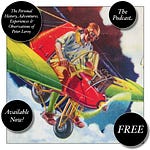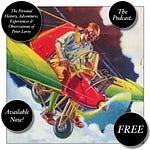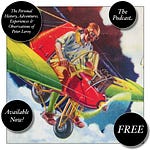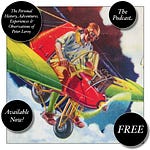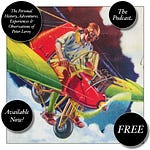34
AN ASIDE, just a short one, on the subject of the practical value of literature. I think that I supposed I had discovered one of the functions of literature: to show us how to behave under unusual circumstances. Since I was still at an age when most circumstances seemed unusual to me, I was grateful for all the help I could get, and knowing how to behave in even the most bizarre and unlikely circumstances—finding oneself up a beanstalk, hiding in an oven, holding a golden-egg-laying goose and trying to keep it from honking—seemed to have some potential use somewhere along the road of life.
Lying there in bed between the twins, harboring a stolen secret, I seemed to spy in the dark the feeble glimmer of an understanding of the relationship between stories and life stories, between art and life. It took the immediate form of a threat of discovery, and it made me tingle. I have to admit that the threat seems more exciting in memory than it was at the time. I wouldn’t have used the word exciting for it then. I would have used frightening. I could imagine the massive pine door to the girls’ room flying open, thundering open, exploding open, and I could imagine Andy Glynn there, enormous, filling the doorway like the giant in “Jack and the Beanstalk,” his huge puffing bulk framed by a ring of backlighting, bellowing, crying out for the blood of the interloper who had stolen his secret.
However—and this is what I meant earlier about the practical value of literature—the fear of discovery led to my seeing myself as an actor in a timeless drama, and that led, ultimately, to a kind of security that eliminated the fear. Like the intercontinental ballistic missiles depicted in the diagrams that appeared frequently in magazines of both the technical and popular kind at that time, my progress to a feeling of security had three stages. (This will be important later on, so I ask you, Reader, not to skip the next few paragraphs.)
First, the understanding that I belonged to a venerable literary tradition brought fear, a fear of Andy Glynn that resembled the fear I had always felt for the giant in “Jack and the Beanstalk” when I was a child.
Second, the fear gave way to the surge of eager anticipation that comes when one is watching a movie and sees through the structure of the plot to the denouement.
Third, as the earlier stages fell away, they launched a lighter, smaller, soaring sensation, something like, but more buoyant than, security, something more than confidence. Call it cockiness. It was the feeling that if the worst should happen I would know what to do. Playing the lead in “Jack and the Beanstalk” added the security of a script to the threat of discovery—and that security is, I suggest, the secret of the comforting and practical value of literature.
I hope that I do not seem to be overestimating that value. I don’t mean to suggest that literature teaches us how to behave in situations for which we might otherwise have no models of behavior at all. I’m suggesting something smaller than that: that literature presents us with some possible models for our behavior in some such situations. However, that is quite a lot, and often it is quite enough. From those models we can extrapolate variations, and from that little start toward savoir faire we gain enough confidence and false security to go on.
To return to my case as a specific example: if the girls and I were discovered and I played “Peter” in “Peter Discovered by the Father of the Glynns,” all the actors in the ensuing drama would be forced to rely heavily on improvisation, the performances would be sloppy and spluttering, and the whole scene would come off, at best, as melodrama, or, at worst, and more likely, as farce. However, my knowledge of the beanstalk tale—and the very existence of the tale, which implied that the other players in the potential drama would know it and would know their parts in it as well as I knew mine—allowed me to believe that if the girls and I were discovered and I stuck to my role as “Jack,” it would be a discovery with a script. If Andy Glynn threw the bedroom door open one night and began bellowing in outraged fury, we would all know what we were to do. We would all have our parts to play. Mine would be to get down that beanstalk as fast as I could.
[to be continued]
Have you missed an episode or two or several?
You can begin reading at the beginning or you can catch up by visiting the archive or consulting the index to the Topical Guide. The Substack serialization of Little Follies begins here; Herb ’n’ Lorna begins here; Reservations Recommended begins here; Where Do You Stop? begins here; What a Piece of Work I Am begins here; At Home with the Glynns begins here.
You can listen to the episodes on the Personal History podcast. Begin at the beginning or scroll through the episodes to find what you’ve missed. The Substack podcast reading of Little Follies begins here; Herb ’n’ Lorna begins here; Reservations Recommended begins here; Where Do You Stop? begins here; What a Piece of Work I Am begins here; At Home with the Glynns begins here.
You can listen to “My Mother Takes a Tumble” and “Do Clams Bite?” complete and uninterrupted as audiobooks through YouTube.
You can ensure that you never miss a future issue by getting a free subscription. (You can help support the work by choosing a paid subscription instead.)
At Apple Books you can download free eBooks of Little Follies, Herb ’n’ Lorna, Reservations Recommended, and Where Do You Stop? and What a Piece of Work I Am.
You’ll find overviews of the entire work in An Introduction to The Personal History, Adventures, Experiences & Observations of Peter Leroy (a pdf document), The Origin Story (here on substack), Between the Lines (a video, here on Substack), and at Encyclopedia.com.





